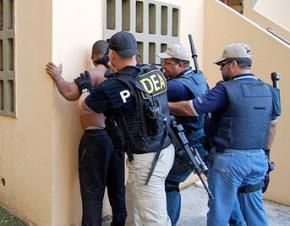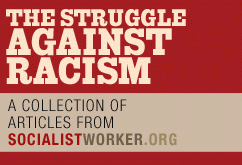Young, Black and criminalized
The U.S. government's four-decade-old "war on drugs" has led to the criminalization of a whole generation of Black and Latino youth, writes .
WHILE MILLIONS of people around the country were reacting with horror and outrage to the revelations about Trayvon Martin's death in Florida, the right-wing media had a different kind of murder in mind: character assassination. When a juicy tidbit from Trayvon's school records leaked to the press, they thought they had their weapon.
According to reports in the media, Trayvon had been staying in Sanford during a suspension from school, after an empty plastic sandwich bag reportedly bearing traces of marijuana was found in his book bag. Trayvon's school had a so-called "zero tolerance" policy.
When this news of Trayvon's suspension for "drug possession"--in reality, non-possession--broke, his family angrily denounced the reports and blamed police for leaking the news to discredit their son. "The only comment that I have right now is that they've killed my son, and now they're trying to kill his reputation," Sybrina Fulton, Trayvon's mom, told a swarm of reporters gathered to report on the latest "revelation."

Fox News' Bill O'Reilly struggled to contain himself. In a March 27 show with Jasmine Rand, an attorney representing Trayvon's family, O'Reilly deployed the usual interview-as-accusation style that he reserves for guests he wants to discredit. "Basically, it's emerging that Trayvon had some problems," said O'Reilly. "And the family does object to that."
"Trayvon was any normal kid in America," Rand replied, adding that Trayvon's mother was correct to insist that the grounds for Travyon's suspension bear absolutely no relevance to his murder. But O'Reilly wasn't satisfied: "In a case of this magnitude, shouldn't the public know the history of Trayvon?"
But the only newsworthy aspect of Trayvon's suspension for non-possession of marijuana is that every mainstream news outlet considered it newsworthy.
If trying marijuana in high school in some way contributed to Trayvon's death, then millions of American teenagers are at risk--not to mention all the years during which their parents and other post-high-school-age adults should have been deemed "suspicious."
Nearly 40 percent of 16- and 17-year-olds--about 3.4 million--have used marijuana at least once in their lives, according to the U.S. Substance Abuse and Mental Health Services Administration. Nearly two-thirds of adults between ages 21 and 54 have also tried marijuana at least once. Statistics also show that people of all races use drugs in similar proportions to their numbers in the general population.
Actually, the truly newsworthy outrage--one that escaped the media's attention--was that a teenager would be suspended for two full weeks, not for possessing marijuana, but for possessing a sandwich bag with alleged traces of marijuana.
WHAT REALLY deserves attention is the abject failure of the U.S. government's four-decade-long "war on drugs" in every way but two. Its successes? The demonization of an entire generation of young, Black men--and increasingly Black women, and Latinos as well--and the waste of enormous amounts of society's resources on building prisons and warehousing prisoners.
Even some high-profile conservative figures are drawing such conclusions, too.
Gary Johnson, the Republican governor of New Mexico from 1995 to 2003, advocates legalization of marijuana and the decriminalization of harder drugs, citing the benefits of decriminalization of heroin in Portugal and Switzerland as models to be emulated. "Over the last 10 years, Portugal has documented a 50 percent decrease in heroin use as a result of having decriminalized heroin," said Johnson.
Even televangelist and media mogul Pat Robertson has since 2010 advocated for the decriminalization of marijuana, returning to the topic on his The 700 Club show on multiple occasions. During a show in early March, he said, "California is spending more money on prisons than it's spending on schools. There's something wrong about that equation...I think we need to scrub the federal and state codes and take away these criminal penalties...[P]utting people in jail at a huge expense to the population is insanity."
Sure, some of Robertson's reasoning is comically misguided--for example, his suggestion that it's "the liberals" who are chiefly responsible for lock-em-up-and-throw-away-the-key policies. Many a Republican governor would take serious offense at receiving anything less than full credit for the incarceration boom. And, of course, he emphasizes the fiscal burden of prisons while ignoring the disproportionate impact on African Americans.
But when it comes to the role played by the Democratic Party in the American rush to incarcerate, Robertson is closer to the mark than many might be inclined to acknowledge.
In the post-Second World War era, Republican President Richard Nixon was the first political leader to conspicuously exploit the issue of crime to advance the conservative agenda in U.S. politics. By linking criminality with "lawless" protesters engaging in civil disobedience, Nixon sought to realign U.S. politics by supplanting segregationist Democrats with a Republican sweep through the Old South.
In 1982, Reagan perfected the method, declaring "war on drugs." He massively ramped up federal spending on enforcement and gave grants to the states to expand their own anti-drug efforts.
But it was Bill Clinton who in 1994 signed into law the most expensive crime bill in U.S. history up to that point. According to Phil Gasper:
The core of his proposal included a sizeable increase in the number of police and an extension of police powers, a further expansion of prison building, and a series of provisions mandating harsher punishments for those found guilty in federal courts. In order to win over Republican votes, Clinton reduced the modest amount of preventative social spending originally contained in the bill. He also jettisoned a provision supported by the Congressional Black Caucus which would have permitted statistical evidence of racial bias to be used by defendants appealing against death penalty sentences.
Today, it's easy to forget this history and focus, as much of the media do, on the "crack cocaine" epidemic as the chief impetus for the U.S. "war on drugs." But the timing is important. Reagan declared the "war on drugs" before the explosion in crack cocaine use, according to statistics. When crack did surface as a growing crisis in Black communities, the racist overtones of the drug war were quickly mobilized--with a little nudge from the Reagan administration, which dedicated staff resources to placing stories about crack cocaine use in the mainstream media.
Suddenly, the press was saturated with stories of "crack babies" that placed blame for the rollback of African American living standards on addicted Black mothers. By 1989, the most vile racism could be passed off common sense in the mainstream media. "The inner-city crack epidemic is now giving birth to the newest horror: a bio-underclass, a generation of physically damaged cocaine babies whose biological inferiority is stamped at birth," wrote Washington Post columnist Charles Krauthammer.
And yet, like so many other cases, we learned years later that what passed as common sense was nothing more than demonization and racism. According to a 2009 New York Times article "The Epidemic That Wasn't," researchers studying children with prenatal exposure to crack cocaine have found "the long-term effects of such exposure on children's brain development and behavior appear relatively small" and are "less severe than those of alcohol and are comparable to those of tobacco."
But the damage was done. Drug use was no longer seen as a public-health issue or a matter of treatment rehabilitation. Drugs became the chief cause of an incarceration boom that has put more Americans behind bars in prisons and jails than any other country in the world, both in proportional and absolute terms. A highly disproportionate section of that prison population is Black and Latino.
THE CONSEQUENCES of the drug war became the new justification for demonizing African Americans. As author Michelle Alexander writes in her book The New Jim Crow:
In the era of colorblindness, it is no longer socially permissible to use race, explicitly, as a justification for discrimination, exclusion and social contempt. So we don't. Rather than rely on race, we use our criminal justice system to label people of color "criminals" and then engage in all the practices we supposedly left behind.
Today it is perfectly legal to discriminate against criminals in nearly all the ways that it was once legal to discriminate against African Americans. Once you're labeled a felon, the old forms of discrimination--employment discrimination, housing discrimination, denial of the right to vote, denial of educational opportunity, denial of food stamps and other public benefits, and exclusion from jury service--are suddenly legal.
As a criminal, you have scarcely more rights, and arguably less respect, than a Black man living in Alabama at the height of Jim Crow. We have not ended racial caste in America; we have merely redesigned it.
The scale of the phenomenon described by Alexander is staggering. The U.S. prison population underwent a six-fold increase in the last 25 years--from 350,000 to 2.3 million. But the raw numbers alone don't describe how the overwhelming impact on African American communities. As Alexander writes:
Human Rights Watch reported in 2000 that, in seven states, African Americans constitute 80 to 90 percent of all drug offenders sent to prison. In at least 15 states, Blacks are admitted to prison on drug charges at a rate from 20 to 57 times greater than that of white men...When the war on drugs gained full steam in the mid-1980s, prison admissions for African Americans skyrocketed, nearly quadrupling in three years, and then increasing steadily until it reached in 2000 a level more than 26 times the level in 1983.
In this context, Trayvon's non-possession does seem relevant. It's part of the story of how a generation of African Americans have been subject to everything from school suspension to raids by SWAT teams to lengthy prison terms for possession of small amounts of drugs to job discrimination ("Have you ever been convicted of a felony?) and more.
It's perhaps more jarring in Trayvon's case because the racist code--"suspended for drug possession"--was supplied after he was murdered. And more tragic because he wouldn't have been in Sanford at the end of February if not for the broad popularity of "zero-tolerance" school policies in post-drug war Amerca.
The racist "war on drugs" will continue to claim its victims in the millions until a mass movement is able to challenge the new Jim Crow system of mass incarceration.



